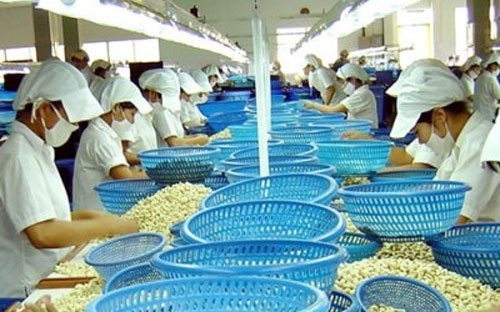 Economy
Economy

The Việt Nam Cashew Association has set standards for cashew processing to nudge the industry towards cleaner production and ensure consistent quality.
 |
| The Việt Nam Cashew Association (Vinacas) has set standards for cashew processing to nudge the industry towards cleaner production and ensure consistent quality. — Photo enternews.vn |
HCM CITY — The Việt Nam Cashew Association (Vinacas) has set standards for cashew processing to nudge the industry towards cleaner production and ensure consistent quality.
The standards, announced at the eighth Việt Nam Golden Cashew Rendezvous in Đà Nẵng last week, cover input materials, technical requirements and equipment involved in cutting the nuts, sizing them at different stages, drying, peeling testa, grading cashew kernel, fumigation, packaging, and export.
For instance, the specifications for raw cashew nuts for processing require the raw nuts to be harvested from cashew trees or transplants without using genetically modified technology and have maximum moisture content of 10 per cent, no mould, pests or bacterial contamination, a natural colour and so on.
There are also comprehensive requirements for cashew processing plants, processing tools and others.
Phạm Văn Công, Vinacas deputy chairman, said firms have applied measures to make products meeting food safety standards for long.
“[But] by promulgation of the standards, the association expects the more than 300 processing factories in the cashew industry to apply them in their production so that the industry can produce products of the same quality.”
Nguyễn Đức Thanh, Vinacas chairman, said the procedures would help the cashew industry meet consumers’ increasing demand for hygiene and food safety standards, non-genetic modification and origin traceability.
Joseph Lang, managing director of Kenkko, one of Europe’s largest buyers, sellers and distributors of nuts and fried fruits, said a recent study on food trends in Europe by Deloittes, a major international consultancy group, identified two types of consumer groups – traditional (49 per cent) and evolving (51 per cent).
While the first group bases its buying on traditional factors like price, taste and convenience, the second group is more concerned about health and sustainability, he said.
As much as 95 per cent of the second group is interested in natural foods with limited processing, preservatives or artificial ingredients.
Thanh said “Luckily, most cashew farmers in Việt Nam do not use banned substances. Products with Việt Nam origin all meet hygiene and food safety standards.”
Nguyễn Anh Hoàng, director of the Bình Phước Province Department of Industry and Trade, said with more than 134,000ha under cashew, Bình Phước accounts for 43 per cent of the country’s total.
The province is also home to hundreds of cashew businesses, he said.
“We are establishing a set of regional criteria for sustainable cashew development, forming large cashew farms with intensive cultivation, transferring advanced technologies, focusing on planting high-quality and high-yield cashew saplings and applying advanced processing technologies to reduce production costs and improve quality and enhance competiveness.”
Using automatic machines instead of manual labour makes it easy to control product quality in terms of colour, size and hygiene in line with international standards, he said.
A business group called Group of Việt Nam Leading Cleaner Cashew Processors and Exporters was formed at the event.
Việt Nam accounts for half of the world’s cashew exports and has been the leading exporter for the last 10 years.
Its cashew products are exported to 80 countries and territories, with the US, Europe and China being the main markets. — VNS




